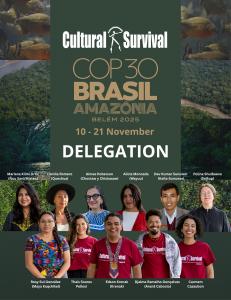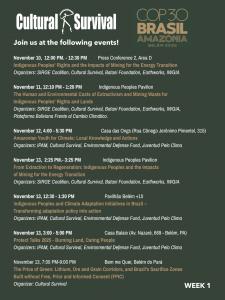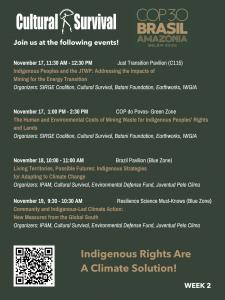Cultural Survival Is at COP30 to Ensure Indigenous Rights Are Part of the Climate Solution
CAMBRIDGE, MA, UNITED STATES, November 7, 2025 /EINPresswire.com/ -- From November 10 to November 21, 2025, the 2025 United Nations Climate Change Conference, also known as the Conference of the Parties to the United Nations Framework Convention on Climate Change (UNFCCC), commonly referred to as COP30, will take place in Belém, the capital of the state of Pará, in Brazil’s lower Amazon region.
This global meeting will bring together government representatives from the 198 countries that are Parties to the Convention, representatives of UN bodies, civil society, academia, industry, and a significant delegation of Indigenous Peoples, women, and youth.
Indigenous representation is essential in moving world leaders to take immediate action on climate change, and that is why members of our team will be attending to join the International Indigenous Peoples Forum on Climate Change (Indigenous Caucus) and other Indigenous and allied leaders in pushing policymakers for urgent and holistic responses to combating and mitigating the impacts of climate change. Proactive efforts to center, resource, and respect Indigenous rights, leadership, and stewardship must be prioritized in all layers of decision-making.
Cultural Survival's in-person delegation includes our staff members: Aimee Roberson (Choctaw and Chickasaw), Executive Director; Alicia Moncada (Wayuu), Director of Advocacy and Communications; Edson Krenak (Krenak), Brazil Program Manager; Rosy Sul González (Maya Kaqchikel), Indigenous Rights Radio Program Manager; Mariana Kiimi Ortiz (Ñuu Savi/Mixtec), Advocacy Associate; Camila Romero (Quechua), Keepers of the Earth Program Assistant; Dev Kumar Sunuwar (Koĩts-Sunuwar), Community Media Program Coordinator; Thaís Soares Pellosi, Executive Assistant; Carmem Cazaubon, Capacity Building Program Assistant; and consultants: Djalma Ramalho (Aranã Caboclo) and Polina Shulbaeva (Selkup).
Our Brazil partners: Newiwe Ana Miranda Top’Tiro (Xavante/A’uwẽ Uptabi), Safira Ribeiro da Silva (Quilombola Mumbuca), Osmar Marcelino Miranda (Aranã Caboclo), and Ailton Seabra Borges (Itacoã Miri).
We will work to demand:
• Finance justice and direct access to climate finance by Indigenous communities.
• End of Sacrifice Zones by dismantling the system of environmental racial sacrifice zones created by extractive projects and infrastructure corridors. No community should bear the cost of "green" transitions that reproduce historical injustices, dispossession, and contamination in the name of just transition or green economy.
• Free, Prior, and Informed Consent in all matters related to Indigenous Peoples, including policies, investments, and extractive industries, and so-called development projects, from cradle to grave, communities must be consulted and consent given or withdrawn.
• End to false solutions such as carbon markets, offsetting, and debt-inducing climate finance.
• Protection of Indigenous Peoples in Voluntary Isolation and Initial Contact.
• Territorial protection and demarcation of Indigenous lands and territories.
• A Just Transition rooted in Indigenous Peoples' rights.
• Precise and systematic integration of Indigenous Knowledge systems in all climate policies, National Determined Contributions, and National Adaptation Plans.
• Direct participation in the design and oversight of transition mineral supply chains.
• Respect and inclusion of Indigenous leadership and knowledge from youth and Elders, through Knowledge Exchange Investments and Youth and Elders Funds.
• Systems for Digital Sovereignty.
• More effective protection of environmental Indigenous rights defenders.
Aimee Roberson (Choctaw and Chickasaw), Executive Director, states, “As we journey to Belém, humanity as a whole is at a fork in the road. Are we going to continue on a path of environmental destruction, or are we going to work collectively to change course and accept our responsibilities to be good stewards of our communities and environments? Will we disregard what we know about the impact of our actions on the ecosystems and climate that support all life on Mother Earth? Or will we listen to the inherent intelligence and wisdom of Indigenous Peoples who know how to live in harmony and balance? Indigenous Peoples are disproportionately impacted by climate change, yet we have a lot to offer toward solutions to this crisis. To be able to provide this valuable leadership, we must be allowed autonomy, self-governance, and collective rights, including the ability to steward the lands and waters of our territories. These things allow our lifeways, languages, cultures, traditional knowledge systems, and Indigenous wisdom to continue and be an example for all of humanity.”
Alicia Moncada (Wayuu), Director of Advocacy and Communications, says, “Indigenous Peoples are on the frontlines of the climate crisis, yet we continue to be excluded from the climate finance and decision-making processes that directly affect our lives. At COP30, we are demanding that climate finance flow directly to Indigenous and community-led solutions and Indigenous-led adaptation strategies. We have protected the majority of the world's biodiversity and its sentient beings, yet our communities are being displaced, our food systems disrupted, and our sacred sites destroyed by climate impacts we did not cause. True climate justice requires reparations for these losses and damages. Climate action is not a political option; it is an obligation, and Indigenous leadership is essential for any real solution.”
Edson Krenak (Krenak), Brazil Program Manager, explains, “After 30 years of global Climate Conferences, Indigenous Peoples call for concrete actions to ensure access to climate finance, the protection and guarantee of their territories, and the safeguarding of their freedom, and right to self-determination. We are facing a flood of false solutions transforming our lands into sacrifice zones for the Green Economy. We demand real actions, not promises! For the first time, our forest communities, Indigenous Peoples, Quilombola, and traditional communities have the opportunity to speak and present their local agendas. As a relative from a traditional community said to me, ‘To show the forest: its smells, tastes, colors, and demands. To make it present itself, without needing to be translated or explained.’ This COP will see the forest up close, not through satellites or images produced and used by those who do not live here. Indigenous Peoples are truly hosting the COP in their own home, and we want this experience to be truly impactful.”
About Cultural Survival
Cultural Survival (CS) is an Indigenous-led NGO and U.S.-registered non-profit that advocates for Indigenous Peoples' rights and supports Indigenous communities’ self-determination, cultures, and political resilience since 1972. For over 53 years, Cultural Survival has partnered with Indigenous communities to advance Indigenous Peoples' rights and cultures worldwide. CS envisions a future that respects and honors Indigenous Peoples' inherent rights and dynamic cultures, deeply and richly interwoven in lands, languages, spiritual traditions, and artistic expression, rooted in self-determination and self-governance. The core of Cultural Survival’s efforts rests on the principles of supporting, amplifying efforts, and raising awareness of self-determination for Indigenous communities. To learn more, visit www.cs.org.
This global meeting will bring together government representatives from the 198 countries that are Parties to the Convention, representatives of UN bodies, civil society, academia, industry, and a significant delegation of Indigenous Peoples, women, and youth.
Indigenous representation is essential in moving world leaders to take immediate action on climate change, and that is why members of our team will be attending to join the International Indigenous Peoples Forum on Climate Change (Indigenous Caucus) and other Indigenous and allied leaders in pushing policymakers for urgent and holistic responses to combating and mitigating the impacts of climate change. Proactive efforts to center, resource, and respect Indigenous rights, leadership, and stewardship must be prioritized in all layers of decision-making.
Cultural Survival's in-person delegation includes our staff members: Aimee Roberson (Choctaw and Chickasaw), Executive Director; Alicia Moncada (Wayuu), Director of Advocacy and Communications; Edson Krenak (Krenak), Brazil Program Manager; Rosy Sul González (Maya Kaqchikel), Indigenous Rights Radio Program Manager; Mariana Kiimi Ortiz (Ñuu Savi/Mixtec), Advocacy Associate; Camila Romero (Quechua), Keepers of the Earth Program Assistant; Dev Kumar Sunuwar (Koĩts-Sunuwar), Community Media Program Coordinator; Thaís Soares Pellosi, Executive Assistant; Carmem Cazaubon, Capacity Building Program Assistant; and consultants: Djalma Ramalho (Aranã Caboclo) and Polina Shulbaeva (Selkup).
Our Brazil partners: Newiwe Ana Miranda Top’Tiro (Xavante/A’uwẽ Uptabi), Safira Ribeiro da Silva (Quilombola Mumbuca), Osmar Marcelino Miranda (Aranã Caboclo), and Ailton Seabra Borges (Itacoã Miri).
We will work to demand:
• Finance justice and direct access to climate finance by Indigenous communities.
• End of Sacrifice Zones by dismantling the system of environmental racial sacrifice zones created by extractive projects and infrastructure corridors. No community should bear the cost of "green" transitions that reproduce historical injustices, dispossession, and contamination in the name of just transition or green economy.
• Free, Prior, and Informed Consent in all matters related to Indigenous Peoples, including policies, investments, and extractive industries, and so-called development projects, from cradle to grave, communities must be consulted and consent given or withdrawn.
• End to false solutions such as carbon markets, offsetting, and debt-inducing climate finance.
• Protection of Indigenous Peoples in Voluntary Isolation and Initial Contact.
• Territorial protection and demarcation of Indigenous lands and territories.
• A Just Transition rooted in Indigenous Peoples' rights.
• Precise and systematic integration of Indigenous Knowledge systems in all climate policies, National Determined Contributions, and National Adaptation Plans.
• Direct participation in the design and oversight of transition mineral supply chains.
• Respect and inclusion of Indigenous leadership and knowledge from youth and Elders, through Knowledge Exchange Investments and Youth and Elders Funds.
• Systems for Digital Sovereignty.
• More effective protection of environmental Indigenous rights defenders.
Aimee Roberson (Choctaw and Chickasaw), Executive Director, states, “As we journey to Belém, humanity as a whole is at a fork in the road. Are we going to continue on a path of environmental destruction, or are we going to work collectively to change course and accept our responsibilities to be good stewards of our communities and environments? Will we disregard what we know about the impact of our actions on the ecosystems and climate that support all life on Mother Earth? Or will we listen to the inherent intelligence and wisdom of Indigenous Peoples who know how to live in harmony and balance? Indigenous Peoples are disproportionately impacted by climate change, yet we have a lot to offer toward solutions to this crisis. To be able to provide this valuable leadership, we must be allowed autonomy, self-governance, and collective rights, including the ability to steward the lands and waters of our territories. These things allow our lifeways, languages, cultures, traditional knowledge systems, and Indigenous wisdom to continue and be an example for all of humanity.”
Alicia Moncada (Wayuu), Director of Advocacy and Communications, says, “Indigenous Peoples are on the frontlines of the climate crisis, yet we continue to be excluded from the climate finance and decision-making processes that directly affect our lives. At COP30, we are demanding that climate finance flow directly to Indigenous and community-led solutions and Indigenous-led adaptation strategies. We have protected the majority of the world's biodiversity and its sentient beings, yet our communities are being displaced, our food systems disrupted, and our sacred sites destroyed by climate impacts we did not cause. True climate justice requires reparations for these losses and damages. Climate action is not a political option; it is an obligation, and Indigenous leadership is essential for any real solution.”
Edson Krenak (Krenak), Brazil Program Manager, explains, “After 30 years of global Climate Conferences, Indigenous Peoples call for concrete actions to ensure access to climate finance, the protection and guarantee of their territories, and the safeguarding of their freedom, and right to self-determination. We are facing a flood of false solutions transforming our lands into sacrifice zones for the Green Economy. We demand real actions, not promises! For the first time, our forest communities, Indigenous Peoples, Quilombola, and traditional communities have the opportunity to speak and present their local agendas. As a relative from a traditional community said to me, ‘To show the forest: its smells, tastes, colors, and demands. To make it present itself, without needing to be translated or explained.’ This COP will see the forest up close, not through satellites or images produced and used by those who do not live here. Indigenous Peoples are truly hosting the COP in their own home, and we want this experience to be truly impactful.”
About Cultural Survival
Cultural Survival (CS) is an Indigenous-led NGO and U.S.-registered non-profit that advocates for Indigenous Peoples' rights and supports Indigenous communities’ self-determination, cultures, and political resilience since 1972. For over 53 years, Cultural Survival has partnered with Indigenous communities to advance Indigenous Peoples' rights and cultures worldwide. CS envisions a future that respects and honors Indigenous Peoples' inherent rights and dynamic cultures, deeply and richly interwoven in lands, languages, spiritual traditions, and artistic expression, rooted in self-determination and self-governance. The core of Cultural Survival’s efforts rests on the principles of supporting, amplifying efforts, and raising awareness of self-determination for Indigenous communities. To learn more, visit www.cs.org.
Agnes Portalewska, Senior Communications Manager
Cultural Survival
agnes@cs.org
Legal Disclaimer:
EIN Presswire provides this news content "as is" without warranty of any kind. We do not accept any responsibility or liability for the accuracy, content, images, videos, licenses, completeness, legality, or reliability of the information contained in this article. If you have any complaints or copyright issues related to this article, kindly contact the author above.




